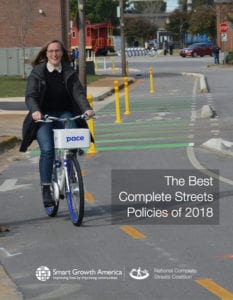Who is a member?
Our members are the local governments of Massachusetts and their elected and appointed leadership.

Smart Growth has released their annual Complete Streets report.
Amherst and Walpole tied for eighth place in the National Complete Streets Coalition’s ranking of the best local “complete streets” policies of 2018.
This year’s report evaluates the 66 complete streets policies that were adopted in 2018, with Cleveland Heights, Ohio, earning the highest grade.
Complete streets policies take into account not only motor vehicles but also pedestrians, cyclists and public transportation access in the planning, design and operational procedures undertaken for construction or renovation of streets, parks, sidewalks and parking lots. The intent is for transportation modes other than vehicles to be considered as a matter of routine and, ultimately, to make non-vehicle options easier and safer.
In Massachusetts, 200 cities and towns, representing 80 percent of the state’s population, have adopted a complete streets policy. Nearly all of these municipalities applied for funding through the Massachusetts Department of Transportation’s Complete Streets Funding Program.
MassDOT has distributed Tier 2 funding to 161 cities and towns to pay for the development of a five-year prioritization plan that lists the most important local projects needed to improve a municipality’s built environment for better walkability, bikeability and public transportation access.
MassDOT has allocated 106 Tier 3 funding awards to 71 municipalities for more than $42 million. Tier 3 provides reimbursements for construction projects.
Funding recipients are listed in MassDOT’s participation report at masscompletestreets.com.
MassDOT will be accepting applications for Tier 3 project funding on Oct. 1, 2019, and May 1, 2020. Submissions can be made through the MassDOT Complete Streets portal one month before the deadlines.
For assistance with developing a complete streets policy, contact D.J. Wilson at the MMA.